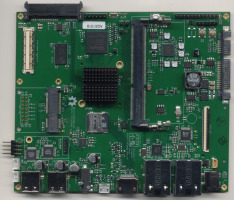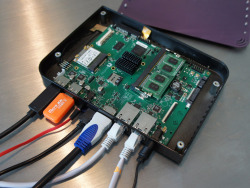Novena open source laptop trades Raspberry Pi headers for power

![]() The revised Novena board
The revised Novena board
Source: Andrew Huang
Former Chumby developer Andrew "bunnie" Huang has shared more details about his Novena open source development laptop on his blog. After having announced the project at the end of last year, the hardware hacker says he went back to the work bench and revised the board design, going with a more powerful FPGA and dropping the Raspberry-Pi-compatible extension header and analogue I/O ports in favour of a much faster expansion header. The new Spartan 6 LX45 FPGA includes a 2Gbit DDR3 buffer and can reach 800MT/s throughput, according to Huang.
To satisfy his desire for a high resolution screen on his development laptop, Huang designed an interface that supports mezzanine adapter boards for different displays. The first adapter board that has been created supports a 13 inch HiDPI screen with a resolution of 2560x1700 pixels. At the moment there is no case for the laptop and Huang is currently testing the hardware with all components loosely plugged into each other with an external keyboard and mouse. The development version of the system is running the ARMhf version of Ubuntu with a custom kernel, but Huang says that this choice is not final and that he is "testing a broad field of distros for compatibility and convenience."

![]() The router enclosure
The router enclosure
Source: Andrew Huang
Huang also shows an external case that houses the main board of the laptop and converts it into a router design – something many people interested in the project requested. Addressing questions of when the laptop will be on sale, Huang says that he has no final release date yet and that the project is still being actively developed. He also says he does not want to sell the design in a traditional manner as the development nature of the Novena project requires users to have a detailed technical understanding of the hardware to use it.
Currently, Huang either wants to sell the system as a kit for self-assembly or have a process whereby potential buyers need to correct a Python or JavaScript program and submit a patch via GitHub to be able to buy the laptop. As far as the price point of the device is concerned, Huang said that "it will be priced in accordance with what you’d expect to pay for a bespoke digital oscilloscope meant to take a position at the lab bench for years, and not a generic craptop that you’ll replace within a year."
(fab)
![Kernel Log: Coming in 3.10 (Part 3) [--] Infrastructure](/imgs/43/1/0/4/2/6/7/2/comingin310_4_kicker-4977194bfb0de0d7.png)

![Kernel Log: Coming in 3.10 (Part 3) [--] Infrastructure](/imgs/43/1/0/4/2/3/2/3/comingin310_3_kicker-151cd7b9e9660f05.png)
















